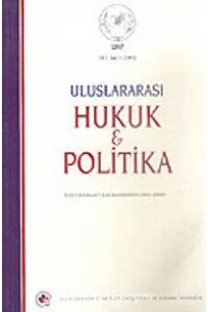Uluslararası kuruluşlar ve uluslararası hukuk kişiliği
Uluslararası kuruluşları tanımlarken kullanılan ölçütlerden birisi uluslararası hukuksal kişiliğe sahip olma öğesidir. Bu çalışmada, uluslararası hukuk kişiliğinin kaç farklı şekilde kazanıldığı, uluslararası hukuk kişisi olarak kabul edildiği halde hükümet dışı kuruluş olarak kurulan veya geleneksel modele uygun olarak kurulduğu halde hukuksal kişiliğe sahip olmayan kuruluşlara örnek verilecektir. Diğer bir deyişle, devletlerarası bir antlaşma ile kurulduğu halde hukuksal kişilik sahibi olmayan kuruluşlar bulunduğu gibi, antlaşma temelli kurulmadığı halde uluslararası hukuk kişisi olarak kabul edilen aktörler de bulunmaktadır. Bu makale uluslararası kuruluşların kaç farklı şekilde kişilik kazanabileceğini ve kendine özgü kimlikleriyle de facto olarak uluslararası hukuk kişisi olarak kabul edilen sui generis aktörlere işaret ederek geleneksel uluslararası kuruluş tanımının yeniden sorgulanması gerektiğine vurgu yapmaktadır.
___
- Akehurst, Michael, A Modern Introduction to International Law, 6. baskı. (Londra: Unwin Hayman, 1988).
- Amerasinghe, F., Principles of the Institutional Law of International Organizations, (Cambridge: Cambridge University Press, 2005).
- Andoura, Sami, ‘The Legal Personality of the European Union’, Studia Diplomatica, Cilt: LX, Sayı: 1, 2007, (Working Paper: European Affairs Program), _____ aei.pitt.edu/ 9083/1/Legal.Personality.EU-PDS-SA.pdf >.
- Başlar, Kemal, ‘Gümrük Birliği Antlaşması’nın (1/95 sayılı Ortaklık Konseyi Kararı’nın) Hukuksal Niteliği’, Ankara Avrupa Çalışmaları Dergisi, Cilt: 4, Sayı: 1, 2004, s. 151- 198.
- Başlar, Kemal, Uluslararası Hukukta Hükümet Dışı Kuruluşlar, (Ankara: USAK, 2005).
- Chappelet, Jean-Loup and Kübler-Mabbott, Brenda, International Olympic Committee and the Olympic System (IOC): The Governance of World Sport, (Londra: Routledge, 2008).
- Dale, W., ‘Is the Commonwealth an International Organisation?’ International Comparative Law Quarterly, Cilt: 31, 1982, s. 451.
- Ettinger, David J., ‘The Legal Status of the International Olympic Committee’, Pace International Law Review. Paper 38, 1992, s. 102. _____http://digitalcommons.pace.edu/ intlaw/38>.
- Gabor, Rona, ‘The ICRC Privilege not to Testify: Confidentiality in Action’, The International Review of the Red Cross, Sayı: 845, Mart 2002.
- Gabor, Rona, ‘The ICRC’s Status: in a Class of its Own’,_____http://www.icrc.org/ Web/eng/siteeng0. nsf/iwpList74/522C6628D83A019741256E3D003FC85F>.
- Gless, Sabine, ‘Interpol’, içinde R. Wolfrum (Ed.), The Max Planck Encyclopedia of Public International Law Online Edition (OUP 2011) (Erişim: http://www.mpepil.com, Ağustos, 2011)
- Kissling, Claudia, ‘The Legal and Political Status of International Parliamentary Institutions’, Background Paper #4, Committee for a Democratic U.N., Berlin, Germany, January 2011, s. 2, _____http://www.kdun.org/resources/ 2011ipis_en.pdf>.
- Klabbers, Jan, An Introduction to International Institutional Law, (Cambridge: Cambridge University Press, 2003).
- Klabbers, Jan, ‘Presumptive Personality: The European Union in International Law’, içinde M. Koskenniemi (ed.), International Law Aspects of the European Union (The Hague: Kluwer Law International, 1998), s. 231–253.
- Lavoyer, Jean-Philippe, ‘The International Committee of the Red Cross - How Does it Protect Victims of Armed Conflict?’, Pace International Law Review, Cilt: 9, Sayı: Yaz, 1997, s. 287-297.
- Lavranos, Nikolaos, Legal Interaction between Decisions of International Organizations and European Law, (Groningen: Europa Law Pub Netherlands, 2004), s. 61-75.
- Muller, A. S., International Organisations and their Host States, (Dordrecht: Kluwer, 1995) Zhenis Kembayev, Legal Aspects of the Regional Integration Processes in the Post-Soviet Area, (Verlag: Springer, 2009).
- Nijman, J. E. The Concept of International Legal Personality, An Inquiry into the History and Theory of International Law, (Lahey: T. M. C. Asser Press, 2004).
- Portmann, Roland, Legal Personality in International Law, (Cambridge: Cambridge University Press, 2010).
- Raluca, David, ‘The European Union and its Legal Personality (1993-2010)’ (25 January 2010). _____http://ssrn.com/abstract=1566492>.
- Ravalico, Filippo, “From GEF to GEM? A Quest for Legal Personality Amid the Unfinished Restructuring of the Global Environmental Facility”, The Fletcher School of Law and Diplomacy, United States, 2010, _____http://conference.unitar.org/yale/sites/conference.unitar.org.yale/files/Paper_Ravalico.pdf>.
- Reinisch, August, International Organizations before National Courts (Cambridge: Cambridge University Press, 2008).
- Richard, Chuang, The International Air Transport Association; A Case Study of a Quasi- Governmental Organization, (Leiden: A. W. Sijthoff, 1972).
- Schermers, Henry G. & Blokker, Niels M., International Institutional Law: Unity within Diversity, (Leiden: Martinus Nijhoff, 2003).
- Schmalenbach, Kirsten, ‘International Organizations or Institutions, General Aspects’, içinde R. Wolfrum (ed.), The Max Planck Encyclopedia of Public International Law Online Edition (OUP 2011), (http://www.mpepil.com, August, 2011).
- Silvestre, Martha, Rutsel J, The Legal Foundations of INTERPOL, (Oxford: Hart Publishing, 2010).
- Silvestre, Martha, Rutsel, ‘Challanging Acts of INTERPOL in Domestic Courts’, içinde August Reinisch (ed.), Challanging Acts of International Organisations Before National Courts, (Oxford: Oxford University Press, 2011), s. 207-238
- Sur, Melda, Uluslararası Hukukun Esasları, 3. Bası, (İstanbul: Beta, 2008). Veldhuizen-Rothenbücherr, Ida van, ‘Legal Personality of the OSCE: Quo Vadis’, OSCE Magazine, Mart-Nisan 2009.
- ISSN: 1305-5208
- Yayın Aralığı: Yılda 5 Sayı
- Başlangıç: 2018
- Yayıncı: Uluslararası Stratejik Araştırmalar Kurumu
Sayıdaki Diğer Makaleler
AB yurttaşlığının ilk yirmi yılının değerlendirilmesi
Uluslararası kuruluşlar ve uluslararası hukuk kişiliği
Romanya'nın Avrupa Birliği bütünleşme sürecinde Romen milliyetçiliği ve etnik Macar azınlığın konumu
Geri göndermeme (Non-Refoulement) ilkesinin uluslararası hukuktaki konumu üzerine bir değerlendirme
Kuramsal tartışmalar ışığında insan güvenliği ve politikaları
Romanya'nın Avrupa Birliği bütünleşme sürecinde Romen milliyetçiliği ve etnik Macar azınlığın konumu
